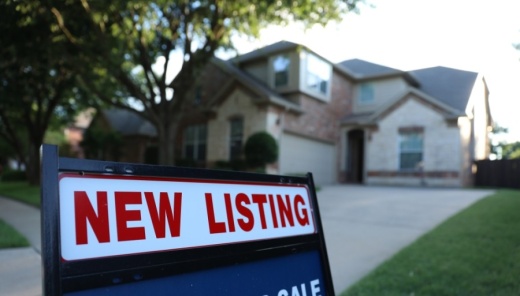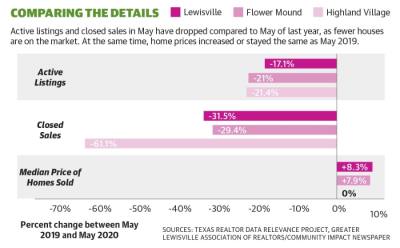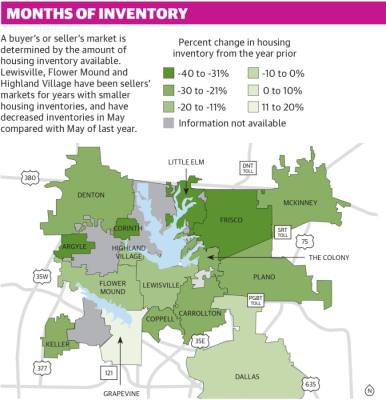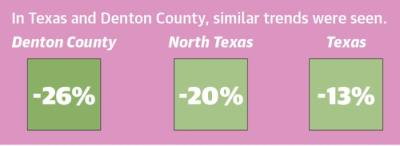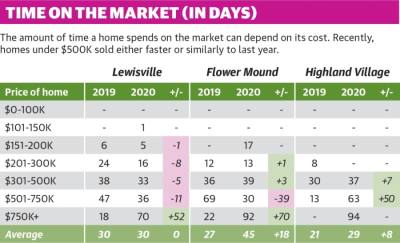Data shows a 32% year-over-year drop in sales for May, according to the Texas Real Estate Center. This is the lowest average of home sales since 2012, the group reported. Lewisville, Flower Mound and Highland Village fared better than the state, with averages closer to 20% lower in May 2020 than in May the year prior.
This could be due to the accessible location of Flower Mound and Lewisville to the rest of the metroplex as well as the quality school rating and low tax rates in Highland Village, according to Realtor Erin Pickard of Brand Properties Group.
“Real estate stayed active in Denton County,” she said. “We worked right through the pandemic.”
Rising prices
Realtor Nicole Smith Woodard said the biggest change for her has been the types of people looking to buy and sell at eXp Realty.
“We don’t have fillers just trying out the market, and we don’t have buyers walking through houses just for fun,” Smith Woodard said. “We have people who are serious about buying and selling in light of world events.”
This has been the case across Denton County, according to Rebecca Ray, president of the Denton-Wise County Association of Realtors. Less serious sellers were also taken out of the equation, Ray said, causing the number of listings to trend downward slightly.
“We’ve honestly felt a positive out of that,” Ray said. “We have not seen a decline in closed properties.”
Homes in the $300,000-$500,000 range have sold especially well recently, said Eyad Salloum, owner of Weichert Realtors in Lewisville. Homes within that range have sold in fewer days on the market in Lewisville than in the year prior, according to data from North Texas Information Systems. In Flower Mound and Highland Village, averages of days on the market were slightly higher than in last May.
Luxury homes, priced $750,000 and up, showed the greatest change, with average days on the market in May increasing by 70 days in Flower Mound and by 52 days in Lewisville as compared to the same month the year before.
In Texas, the average price of homes dropped slightly from May of last year. However, in Highland Village and Lewisville, prices rose by roughly 8%. Flower Mound, which had the highest median price of homes out of the three cities, saw that figure stay the same as the year before.
Higher list prices are also a symptom of fewer homes being on the market, according to Salloum. Flower Mound, Lewisville and Highland Village
are mostly built out, and new home construction, while popular, is slowing, Smith Woodard said.
During the pandemic, interest rates fell to an extremely low level, with some even as low as 3% in March, Pickard said. The interest rate has fluctuated over the last few months but has stayed low enough to encourage buyers.
As more people begin looking for real estate again, the lack of inventory could cause a problem, Salloum said.
“You can say that [a lot of] buyers kind of hit the pause button, not the stop button,” Salloum said. “They’re waiting. And once this is done and over with—Oh, my gosh, I think the market is going to be flooded with buyers.”
Ray, however, believes that the number of listings are likely to bounce back to balance the market after seeing positive progress in May.
An uncertain future
Nationwide delinquency rates on mortgages were at the lowest in 21 years this March, according to a performance report by CoreLogic. In another report, the analyst group said that only 3.7% of those with loans in the Dallas-Fort Worth area had missed at least one mortgage payment in March, a slight decrease from the year before.
Roughly 4.3 million Americans had taken on loan payment forbearance by the end of May, according to a Mortgage Bankers Association report. Those who are unable to pay the remaining balance or re finance at the end of the forbearance period might be pressured to sell their homes, Pickard said. In Denton County, this is less likely to be a problem, because many homeowners are seasoned or semi-retired, Ray said.
While many were faced with unemployment in the last few months, a large portion of those hit hardest were service industry workers, who are less likely to be homeowners, Smith Woodard said.
“For the most part, I have yet to experience anybody selling in a distressed situation,” Smith Woodard said. “And I don’t envision we will see that for at least the next few years.”
A sentiment echoed by Salloum, Smith Woodard and Pickard is that the future of real estate is uncertain because of the pandemic, but the outlook appears to be positive, Ray said.
“This is what’s happening, and this is what [we] see this month, but that does not mean this is what the trend is,” Salloum said. “We have to see historic data ... to be able to make that determination, but we cannot predict what they’re going to do next month or the month after, so on and so forth.”




